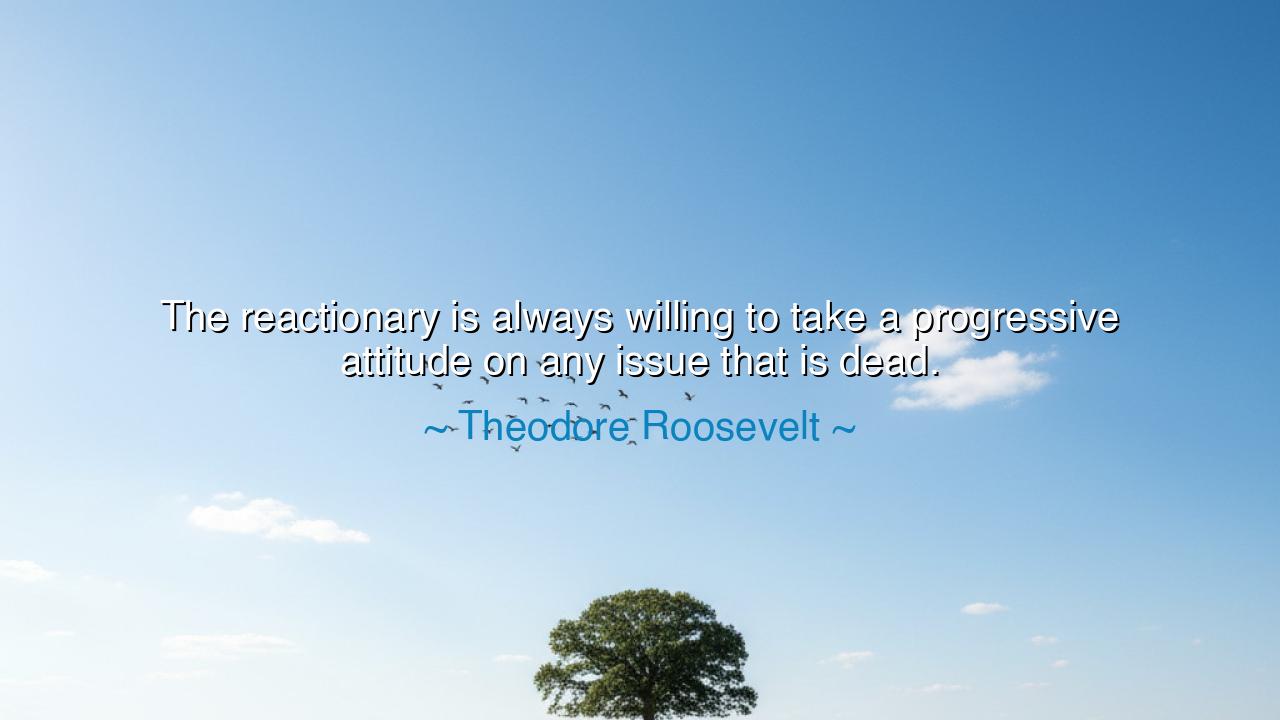
The reactionary is always willing to take a progressive attitude
The reactionary is always willing to take a progressive attitude on any issue that is dead.






Host: The room was calm, the soft light from the lamp casting a quiet glow across the space. Jack sat at the table, his fingers lightly tapping on the surface, deep in thought. Jeeny stood by the window, her arms loosely folded, her gaze fixed on the street outside. The words of Theodore Roosevelt had just been shared, and they seemed to invite a reflection on the intersection of progress, reaction, and the way ideas evolve—or fail to evolve—over time.
Jeeny: “I’ve been thinking about what Theodore Roosevelt said: ‘The reactionary is always willing to take a progressive attitude on any issue that is dead.’ It’s a bit of a biting statement, isn’t it? The idea that the reactionary, the person who resists change, is often willing to embrace progress when it doesn’t challenge the status quo anymore, when the issue is resolved or irrelevant.”
Jack: “Yes, it’s a sharp criticism of how some people engage with change. Roosevelt is saying that the reactionary is fine with progress—but only when it doesn’t threaten anything they’ve built or believed in. The real challenge for them is the active progress, the changes that are challenging or disruptive. The moment the issue is no longer a threat or requires action, they’re happy to embrace it.”
Jeeny: “Exactly. The reactionary wants to maintain control, to keep things the way they are. But when progress is no longer something they have to engage with, when it’s no longer threatening or revolutionary, they can easily claim to support it. It’s like a superficial endorsement—one that doesn’t require them to take a hard stance or truly challenge the systems in place.”
Host: The stillness in the room deepened as they both processed the implications of Roosevelt’s words. The critique of inauthentic progressivism, where people claim support for change only when it no longer challenges their power or comforts, was clear. Jack’s fingers stilled on the table, and Jeeny’s gaze softened as she reflected on the tension between genuine progress and superficial support.
Jack: “It almost feels like Roosevelt is warning against complacency. If you’re only willing to support progress when it’s easy or when it doesn’t disrupt your comfort, are you really a supporter of change, or are you just taking advantage of the progress that’s already been made? It’s a cynical way of acknowledging change, isn’t it?”
Jeeny: “Yes, and it highlights how often real change is met with resistance. The reactionary isn’t against progress in theory—they’re just against progress when it challenges their beliefs, their position, or the system they benefit from. Once change becomes inevitable or non-threatening, they’ll gladly get on board, but it’s more about appearing progressive than actually participating in meaningful transformation.”
Jack: “That’s the interesting part. A reactionary might publicly declare support for progressive causes once they’ve already been accepted, but the real test of progress is whether people are willing to engage with it while it’s still an active issue. When something is in flux, when it’s threatening to the way things have been, that’s when true commitment to progress is shown.”
Jeeny: “Exactly. It’s about authenticity. Supporting change when it’s easy is just performative. The true measure of someone’s commitment to progress is how they engage with it when it’s still a challenge, when it’s still controversial, and when it requires them to give up something. That’s when you see who is truly committed to moving forward and who is simply willing to take credit for progress after the hard work has already been done.”
Host: The room felt even quieter now, the weight of the conversation sinking deeper. Roosevelt’s words had opened a reflection on how true progress is often met with resistance, and how some people will only embrace change when it no longer threatens their position. The world outside had grown darker, but inside, there was clarity—a reminder that real change requires active engagement, not just passive acceptance after the fact.
Jack: “So, Roosevelt is essentially calling out people who embrace progress as a badge once it’s easy or already accepted. It’s the active resistance to real change that defines the true spirit of a reactionary. They don’t fight progress—they fight progress that disrupts their current comfort.”
Jeeny: “Yes, and that’s why genuine progress often requires more than just public support—it requires people to be willing to act and push forward even when it’s difficult. True commitment to progress isn’t about taking the credit after it’s done; it’s about participating in the struggle, facing the discomfort, and being willing to challenge the status quo.”
Host: The evening had grown even quieter, and the weight of the conversation had settled into a deeper reflection on the nature of progress. Roosevelt’s words had reminded them both that true commitment to change doesn’t come after the fact; it comes in the moments when progress challenges us, when it asks us to confront our own complacency and embrace discomfort for the sake of genuine transformation.






AAdministratorAdministrator
Welcome, honored guests. Please leave a comment, we will respond soon